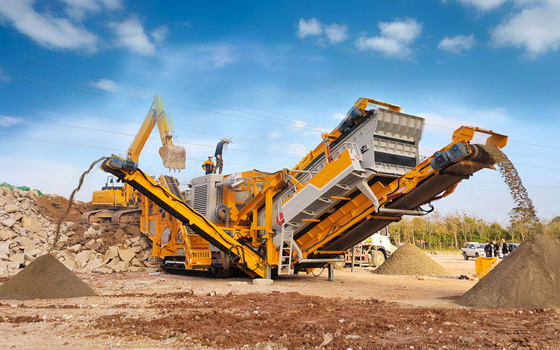How to Choose the Right Parts for Your Impact Crusher: A Comprehensive Guide
Release Time:
2025-09-11
Author:
Source:
How to Choose the Right Parts for Your Impact Crusher: A Comprehensive Guide Impact crushers are critical machinery in the manufacturing and processing industries, particularly in sectors like construction, mining, and recycling. The efficiency and longevity of these machines hinge on the quality and suitability of their parts. Choosing the right components not only enhances performance but also m
How to Choose the Right Parts for Your Impact Crusher: A Comprehensive Guide
Impact crushers are critical machinery in the manufacturing and processing industries, particularly in sectors like construction, mining, and recycling. The efficiency and longevity of these machines hinge on the quality and suitability of their parts. Choosing the right components not only enhances performance but also minimizes downtime and repair costs. In this guide, we will explore the essential aspects to consider when selecting parts for your impact crusher.
Table of Contents
- Understanding Impact Crushers
- The Importance of Quality Parts
- Key Components of an Impact Crusher
- Factors to Consider When Choosing Parts
- Material Compatibility
- Selecting a Reliable Parts Supplier
- Maintenance Tips for Your Impact Crusher
- Common Issues and Solutions
- Conclusion
- FAQs
Understanding Impact Crushers
Impact crushers are designed to send a high-speed projectile against the material to break it down into smaller pieces. They are widely used for crushing rocks, concrete, and asphalt. The machinery typically consists of a rotor that spins rapidly to propel material into impact plates. Understanding the mechanics of your impact crusher is vital for selecting the right parts.
The Importance of Quality Parts
Using quality parts in your impact crusher is non-negotiable. High-quality components ensure that your machine operates efficiently and safely. Poor-quality parts can lead to frequent breakdowns, inefficient crushing, and ultimately, increased operational costs. Investing in reputable parts is essential for ensuring reliability and performance.
Key Components of an Impact Crusher
An impact crusher's performance relies on various key components. Understanding these parts can help you make informed decisions about replacements and upgrades.
The Rotor
The rotor is the heart of the impact crusher. It is responsible for the rotation that propels the material against the impact plates. A well-designed rotor enhances the overall efficiency of the crushing process.
Impact Plates
Impact plates are crucial for directing the material flow and absorbing the impact energy. They play a significant role in determining the quality of the crushed material.
Hammers
Hammers are attached to the rotor and are the primary tools for crushing the material. The right hammer material and design can significantly affect the efficiency and longevity of the impact crusher.
Feed Openings and Chutes
These components are essential for ensuring a smooth and uninterrupted flow of material into the crusher. Properly sized and designed feed openings facilitate optimal performance.
Factors to Consider When Choosing Parts
When selecting parts for your impact crusher, several factors come into play:
Material Quality
The composition and durability of materials used in parts are crucial. Look for parts made from high-strength alloys or wear-resistant materials to ensure longevity.
Compatibility
Ensure that the parts you select are compatible with your specific model of impact crusher. Mismatched components can lead to poor performance and safety hazards.
Performance Specifications
Each component has specific performance criteria. It’s essential to choose parts that meet or exceed these specifications to maintain optimal efficiency.
Material Compatibility
Material compatibility is a key factor when selecting parts for your impact crusher. Different materials require different types of parts. For example:
Metals
When crushing harder materials, such as granite or basalt, it’s advisable to use high-chromium steel or manganese steel for hammers and impact plates.
Composite Materials
For softer materials, parts made from composite materials may be sufficient, providing a balance between performance and cost.
Selecting a Reliable Parts Supplier
Choosing a reputable supplier is critical for obtaining quality parts. Here are some tips for selecting the right supplier:
Reputation
Research potential suppliers’ reputations in the industry. Look for customer reviews, ratings, and testimonials.
Range of Products
A good supplier should offer a wide range of parts to meet various needs. This ensures you can find compatible components for your specific model.
After-Sales Support
Evaluate the level of customer support provided by the supplier. Access to technical assistance and warranty policies can save you time and money in the long run.
Maintenance Tips for Your Impact Crusher
Regular maintenance is vital for the performance of your impact crusher. Here are some essential maintenance tips:
Regular Inspections
Perform routine inspections of all major components. Look for signs of wear and tear, and replace parts as necessary.
Lubrication
Ensure that moving parts are adequately lubricated to reduce friction and wear. Follow the manufacturer’s guidelines for lubrication intervals.
Cleanliness
Keep the machine clean and free of debris. Accumulated dirt and material can interfere with operation and cause premature wear.
Common Issues and Solutions
Understanding common problems can help you minimize downtime:
Excessive Vibration
Excessive vibration can indicate misaligned or damaged components. Regularly check and adjust component alignment to resolve this issue.
Poor Material Flow
If material flow is interrupted, inspect the feed openings and chutes for blockages. Ensure that all components are properly sized.
Increased Wear Rates
Increased wear rates can signify inadequate material compatibility. Reassess the materials being processed and consider upgrading to more suitable parts.
Conclusion
Choosing the right parts for your impact crusher is essential for ensuring optimal performance and longevity. By understanding the key components and factors to consider, you can make informed decisions that will enhance your machine's efficiency. Quality parts, material compatibility, and reliable suppliers are all critical elements to consider. Regular maintenance and addressing common issues will further ensure that your impact crusher operates at peak performance. With these insights, you are now equipped to make the best choices for your crushing operations.
FAQs
1. What are the most critical parts of an impact crusher?
The most critical parts include the rotor, impact plates, hammers, and feed openings. Each component plays a vital role in the efficiency and functionality of the impact crusher.
2. How often should I replace the parts of my impact crusher?
The frequency of replacement depends on usage and material being crushed. Regular inspections should guide you on when to replace parts to ensure optimal performance.
3. Can I use aftermarket parts for my impact crusher?
Yes, but ensure that aftermarket parts are of high quality and compatible with your specific model to avoid operational issues.
4. How can I improve the lifespan of my impact crusher parts?
Regular maintenance, using quality parts, and ensuring material compatibility can significantly enhance the lifespan of your impact crusher parts.
5. What are the signs that my impact crusher needs new parts?
Signs include excessive vibration, poor material flow, unusual noises, and increased wear rates on existing parts. Regular inspections can help identify these issues early.
Keywords:
Jaw crusher parts | Shredder parts | Cone crusher Parts | Ball mill parts
Related News









